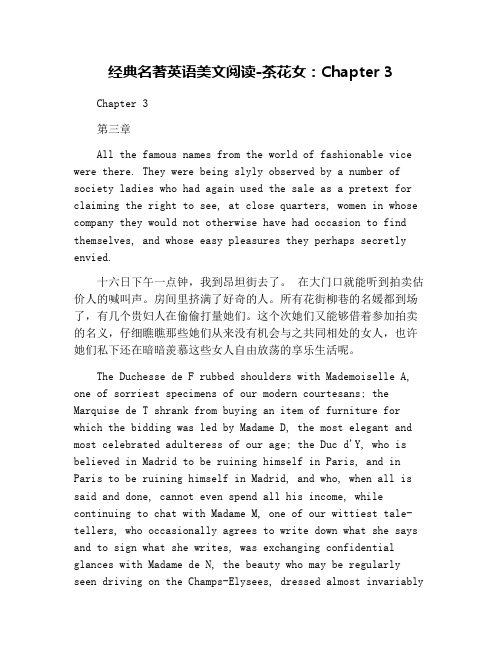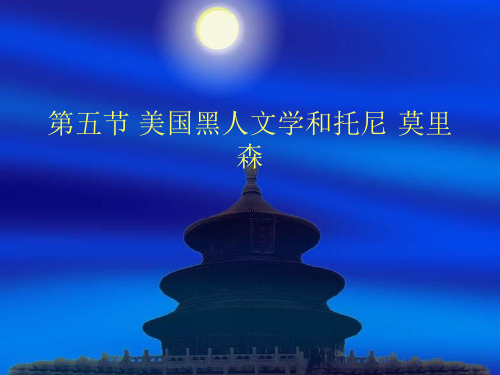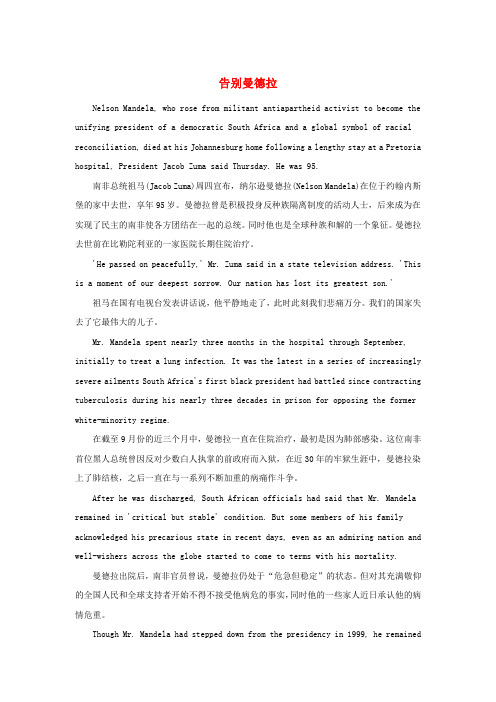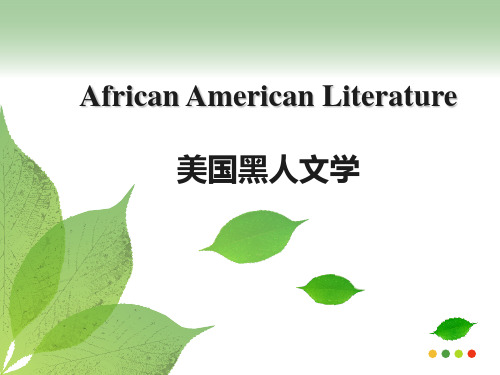第三章 非洲及非洲裔英语文学
扎迪·史密斯《摇摆时光》中的黑人美学忧郁症研究

第34卷 第5期2023年9月广东外语外贸大学学报JournalofGuangdongUniversityofForeignStudiesVol 34 No.5Sep.2023基金项目:大连外国语大学研究生创新项目“扎迪·史密斯小说中的黑人美学忧郁症研究———以《论美》与《摇摆时光》为例”(YJSCX2021-046)。
作者简介:焦子珊,上海外国语大学英语学院博士生,研究方向为当代英国文学。
扎迪·史密斯《摇摆时光》中的黑人美学忧郁症焦子珊 摘要:《摇摆时光》是英国族裔小说家扎迪·史密斯于2016年发表的第五部长篇小说,小说第一次从拥有棕色皮肤且通篇并未提及姓名的“我”的视角出发,通过主人公自身复杂的成长经历,逐渐透露出“我”由于黑人性的丧失而深陷黑人美学忧郁症的现状,这主要表现为对自身的非洲自然特征,尤其是棕色皮肤产生的忧郁感,以及对以音乐、舞蹈为代表的非洲传统艺术形式的排斥,“我”也因此踏上了前往非洲大陆的寻根之旅。
然而,小说中的这段旅途并没有让“我”找到归属感:当“我”选择离开英国,真正站在非洲大陆上,却只能感受到同时不被当地黑人与英国白人接受的残酷现状。
最终,回到英国黑人社区的“我”重遇了同样拥有棕色皮肤,选择融入英国白人社会却惨遭失败的好朋友特蕾西,二人共同找到杂合性的文化身份,并在此基础上实现了英国族裔群体以“棕色性”为核心的杂合性黑人美学的创建。
关键词:扎迪·史密斯;《摇摆时光》;黑人美学忧郁症;杂合性黑人美学 中图分类号:I106 4 文献标识码:A 文章编号:1672-0962(2023)05-0128-12引 言当代英国族裔小说家扎迪·史密斯(ZadieSmith,1975-)2016年最新发表的长篇小说《摇摆时光》(SwingTime,2016)是其在文学创作中的一次新尝试,小说从一个拥有棕色皮肤且通篇未提及明确姓名的女孩“我”的视角出发,以音乐和舞蹈为媒介,描绘了“我”与同样拥有棕色皮肤的朋友特蕾西在成长过程中产生的身份困惑,在英国与非洲大陆上丧失归属感后选择回到英国黑人社区实现身份扎迪·史密斯《摇摆时光》中的黑人美学忧郁症追寻的故事。
英语原版小说《非洲孩子》900字读后感(全英文版)

英语原版小说《非洲孩子》900字读后感(全英文版)Book report:About The African ChildName:Number:Time: the fourth semesterAfter Read The African ChildThe African Child was written by an African writer called Camara Laye, who gave me a different perspective about seEing the African children. It is really a book which is worth reading although it do not belong to the best-sellers or the newest publication. It is just a book written in a very long time ago by a not that famous writer, but youll find it fantastic or you will finally get something after read the book.Now lets see the details. The African Child is a book collected by Collins English Library, and the library graded it with level 4. The level represents a text written within a basic vocabulary of 500 words and appropriate structures, 2:1000 words, 3:2000 words, 4:3000 words, 5:5000 words. The Collins English library series are written for students of English as a second or foreign language and for reluctant native readers. The African child only contains 12 chapters, but for me, its the perfect, because I cannot read that much words in a short time by myreading speed, I know I have to do with my reading.At the beginning of the book, there is a short passage written for the writers mother to express the writers thanks towards his great mother, and also, to appreciate the women of Africa. Then comes the story. It is a true story about the author himself became a man, and finally left his hometown and family. During the reading process, I find something interesting and touching. I used to misunderstood that all the African family are living a poor and unhappy life, and the woman here has little importance in their society. Now I know that not everything is so absolute. The author tells us that some people may hold this view for many years, but Africa is huge, with many different ways of life, and in their country the woman has considerable freedom and power. In his hometown, his mother was respected and admired greatly not only for her strong mind, but also her strange powers. He really had a mother with fantastic powers just like magic. In the book, it seems just many of them have magic, his fathers black guiding snake which guided him to do the right thing, and led him to the way of success. And also, his mothers power to make animals come to life, the mystical sema or medicine man, and marabouts who have a magic power to make wishes come true or can predict future just like a wizard. In the beginning of the book, I saw that those African boys did not live a hard time. Instead, they were happy almost every day, they loved wild animals, and the wild animals like snakes never hurt them,snakes are thought to be good friends and tutor to them. In a certain time, the author would go to visit his grandmother who lived in countryside. Here everybody knew everybody else, they know almost everything about each other, and each others secrets, but they were very considerate to each other in a country manner. Here we can see that country manners do not mean rough manners, people are more polite in the country than in the town. They have more time, and the way of life is simpler in the country, but there are accepted rules. Although everyone knows everything about everyone elses lives, they are always very careful about each others personal freedom. And if their minds seem to work more slowly in the country, it is because speech is a serious matter. They always think careful before speaking. Here author spent a very happy time. He enjoyed the activity of cutting rice with adult and partners just as young as he is, he liked the sound of drum while cutting rice, and he loved to keep the birds away from their rice on the ground. He could swim in the river with others freely, and climb trees as he want even though his clothes would be torn. He was not afraid of that here, he had a grandma who would mend it without complain. She loved her grandson.But life is not happy all the time; there surely will be some hard time to spend. As the author went to school, old boys always hit the younger students, took their food and money away, but the young was too afraid to tell their fathers. Finally one day, hungry and hurt, one of the youngerstudents dared to tell all about it to his father, one of the most famous people in the town, so the problem was solved, and the younger students was lived in a happy life ever after.Time flies, here came the day of boys becoming men. They would experience the circumcision. The process is hurt, but its the price of becoming a man. All the boys behaved very bravely that they never cried out under the almost unbearable pain. They were the African children!, In the end, I want to say that although there are some strange customs in Africa, I do changed my view on the African lives. Maybe they do not as wealthy as the Europeans, but they are living a happy life too, just like the author said, Africa is huge, theres different ways of life. Now I see Africa as a place full of love, care, magic and natural life.。
经典名著英语美文阅读-茶花女:Chapter 3

经典名著英语美文阅读-茶花女:Chapter 3Chapter 3第三章All the famous names from the world of fashionable vice were there. They were being slyly observed by a number of society ladies who had again used the sale as a pretext for claiming the right to see, at close quarters, women in whose company they would not otherwise have had occasion to find themselves, and whose easy pleasures they perhaps secretly envied.十六日下午一点钟,我到昂坦街去了。
在大门口就能听到拍卖估价人的喊叫声。
房间里挤满了好奇的人。
所有花街柳巷的名媛都到场了,有几个贵妇人在偷偷打量她们。
这个次她们又能够借着参加拍卖的名义,仔细瞧瞧那些她们从来没有机会与之共同相处的女人,也许她们私下还在暗暗羡慕这些女人自由放荡的享乐生活呢。
The Duchesse de F rubbed shoulders with Mademoiselle A, one of sorriest specimens of our modern courtesans; the Marquise de T shrank from buying an item of furniture for which the bidding was led by Madame D, the most elegant and most celebrated adulteress of our age; the Duc d'Y, who is believed in Madrid to be ruining himself in Paris, and in Paris to be ruining himself in Madrid, and who, when all is said and done, cannot even spend all his income, while continuing to chat with Madame M, one of our wittiest tale-tellers, who occasionally agrees to write down what she says and to sign what she writes, was exchanging confidential glances with Madame de N, the beauty who may be regularly seen driving on the Champs-Elysees, dressed almost invariablyin pink or blue, in a carriage drawn by two large blackhorses sold to her by Tony for ten thousand francs...and paid for in full; lastly, Mademoiselle R, who by sheer talent makes twice what ladies of fashion make with their dowries, and three times as much as what the rest make out of theirlove affairs, had come in spite of the cold to make a few purchases, and it was not she who attracted the fewest eyes.F公爵夫人的胳膊撞上了A小姐;A小姐是当今妓女圈子里一位典型的薄命红颜;T侯爵夫人正在犹豫要不要把D夫人一个劲儿在抬价的那件家具买下来;D夫人是当代最风流最有名的荡妇。
美国黑人文学和托尼莫里森

小说方面,赖特(Rich Wright)的《土生子》 是40年代城市现实主义最出色的代表作。十 二年后,艾里森(Ralph Ellison)写出《看
不见的人》,被许多评论家认为是美国战后 “最杰出的一部作品”。1983年沃克(Alice Walker)的《紫颜色》获普利策图书奖。五 年后,莫里森(Toni Morrison)的《娇女》也 获得该图书奖。1993年莫里森又荣获诺贝尔 文学奖。
《土生子》
“抗议小说”的经典之作《土生子》(Native Son) :1940
赖特:“有关《汤姆叔叔的孩子们》的评论开始出 现时,我意识到自己犯了一个极其天真的错误。我 发现自己写的书连银行家的闺秀们也会去读,会为 之掉泪,并且感觉良好。于是我发誓,如果再写小 说,我要叫任何人也无法掉泪;小说要写得冷酷而 深刻,读者必须直面这部书,毫无泪水的慰藉。正 是这种心态促使我极其认真地动手去写。”
第五节 美国黑人文学和托尼·莫里 森
一、美国黑人文学
在诗歌方面,黑人诗人休斯(Langstm Hughes)、海登(Robert Hayden)、安 吉罗(Maya Angelou)、达夫(Rita Dove) 等人是美国诗坛重要的声音,他们的诗篇大 大拓宽了美国诗歌的领域。
在戏剧方面,汉丝贝丽(L0orraine Hansberry)、福勒(Charles Fuller)、威 尔逊(August Wilson)等人的剧作给美国 剧坛吹来一阵新风。
鲍德温和《向苍天呼吁》
五六十年代美国黑人文学的一个主要声音来自小说 家和散文作家鲍德温(James Baldwin)
处女作《向苍天呼吁》(Go Tell on the MOuntain,1953)
在鲍德温看来,美国黑人是美国文明的“私生子”, 其本质是遭遗弃和受辱。
非洲美国文学8、African American Literature

B. African American literature and arts surged in the early 1900s.
In
the autumn of 1926, a group of young African American writers produced Fire!, a literary magazine.
The diverse literary expression of the Harlem Renaissance was demonstrated through Langston Hughes’s weaving of the rhythms of African American music into his poems of ghetto life, as in The Weary Blues (1926).
• 梦想 • • • • • • • • 紧随梦想 一旦梦想迷失 生命就如折翅小鸟 无法翱翔 紧随梦想 一旦梦想丢失 生命将是一片荒土 霜雪交加
• • • •
Hold fast to dreams For when dreams go Life is a barren field Frozen with snow.
With
Fire! a new generation of young writers and artists, including Langston Hughes and Zora Neale Hurston, took ownership of the literary Renaissance.
As
more and more educated and socially conscious African Americans settled in New York’s neighborhood of Harlem, it developed into the political and cultural center of black America.
刍议黑人英语起源的研究

二十 世纪六 十 年代 是 黑 人 英 语 的研 究 的顶 峰 时期 , 它
从 时 间上 讲 , 有 关 黑 人 英语 的起 源 的研 究 先后 产 生 过
的原 动力来 自于黑人 民权 的兴 起 , 黑 人 大规 模 进 入城 市 , 冀 望 实现“ 美 国梦 ” , 种族 主义很快 击碎 了这 一 奢侈 的美 梦 , 黑 人 因此 掀起 了声势 浩大 的抗议 活 动 。黑人 的躁 动也 引起 了 行政 当局 的不 安 , 美 国政 府 出资建 立 了“ 应 用语 言学研 究 中
竞技场 、 娱乐业 , 黑人非常活跃 , 所以黑人英语受到广泛关
注, 但有关 它 的起源 、 演 变 的研 究 还 非 常不 充分 。对 于语 言 起 源研 究 的意义 , 历 史 比较 语言 学奠 基人 格林 认 为 “ 我们 的 语 言就 是我们 的 历史 ” , 的确 了解 一 个族 群 , 从语 言是 一 个
( p i d g i n , 或 译洋 泾 浜 ) , 而后发展成为母语 , 也 就 是 克 里 奥
研 究者 从种 族 主义 立 场 出发 , 试 图 通过 黑 人 英 语 的 特殊 之 处来证 明黑人 “ 劣等” , 荒 唐地 推 定 黑 人 因为 嘴唇 厚 、 脑小、
生性懒惰, 所以连英语都说不好。这一派被称为“ 语言缺陷 假 说派 ” ( L a n g u a g e D e i f c i t H y p o t h e s i s ) 。实 质上 称 它 为种 族
语当中。由此可见 , 黑人英语作为一种民族 方言似乎也难
以成 立 。 三、 关 于黑 人英语 起源 的主 流观点
高中英语双语阅读Unit5NelsonMandelaamodernhero告别曼德拉素材新人教版必修

告别曼德拉Nelson Mandela, who rose from militant antiapartheid activist to become the unifying president of a democratic South Africa and a global symbol of racial reconciliation, died at his Johannesburg home following a lengthy stay at a Pretoria hospital, President Jacob Zuma said Thursday. He was 95.南非总统祖马(Jacob Zuma)周四宣布,纳尔逊曼德拉(Nelson Mandela)在位于约翰内斯堡的家中去世,享年95岁。
曼德拉曾是积极投身反种族隔离制度的活动人士,后来成为在实现了民主的南非使各方团结在一起的总统。
同时他也是全球种族和解的一个象征。
曼德拉去世前在比勒陀利亚的一家医院长期住院治疗。
'He passed on peacefully,' Mr. Zuma said in a state television address. 'This is a moment of our deepest sorrow. Our nation has lost its greatest son.' 祖马在国有电视台发表讲话说,他平静地走了,此时此刻我们悲痛万分。
我们的国家失去了它最伟大的儿子。
Mr. Mandela spent nearly three months in the hospital through September, initially to treat a lung infection. It was the latest in a series of increasingly severe ailments South Africa's first black president had battled since contracting tuberculosis during his nearly three decades in prison for opposing the former white-minority regime.在截至9月份的近三个月中,曼德拉一直在住院治疗,最初是因为肺部感染。
African-American-Literature知识讲解

3. Modernism
• Zora Neale Hurston: Their Eyes Were Watching God • Richard Wright: Native son • Ralph Ellison: The Invisible Man
• The outpouring of African American literature in the 1980s and 1990s by such writers as Toni Morrison, Alice Walker.
“If We Must Die” by Mckay
If we must die, let it not be like hogs 若我们必须牺牲,不要像猪一般死去
Hunted and penned in an inglorious spot, 被囚禁在一个不体面的处所,
While round us bark the mad and hungry dogs 疯狂而饥饿的狗在我们周围吠叫
Though far outnumbered let us show us brave, 尽管敌人数目众多,让我们鼓起勇气来,
And for their thousand blows deal one death blow! 把对他们的万千控诉汇成致命一击!
- 1、下载文档前请自行甄别文档内容的完整性,平台不提供额外的编辑、内容补充、找答案等附加服务。
- 2、"仅部分预览"的文档,不可在线预览部分如存在完整性等问题,可反馈申请退款(可完整预览的文档不适用该条件!)。
- 3、如文档侵犯您的权益,请联系客服反馈,我们会尽快为您处理(人工客服工作时间:9:00-18:30)。
• Unlike his near-contemporary Chinua Achebe, Tutuola was not highly educated. He wrote in English rather than his mother tongue Yoruba because he wanted “to reach a wider audience to which this local material may have more general interest”, but the English he uses in his stories is “not polished or sophisticated” but instead captures the way English was spoken in Nigeria by ordinary people (Parrinder 10).
Tutuola’s Writing
• 《 棕 榈 酒 醉 鬼 故 事 》(The Palm Wine Drinkard: : and his dead Palm-wine Tapster in the Deads‟Town ,1952) • 《我在充满鬼怪的热带雨林中的生活》(M y Life in the Bush of Ghosts,1954) • 《 辛 比 和 黑 丛 林 的 神 》(Simbi and the Satyr of the Dark Jungle,1955)
《纽约》
• 黑非洲: “麦苗绿色的轻风”、“舞蹈者赤裸的双脚耕 耘过的”和“笼罩在白色蜜酒和黑色牛奶的溪流中”的人 行道、“长矛一般的乳房”、“百合与神话面具的假面的 芭蕾”、“爱情的芒果”和“达姆鼓的血液”(《黑女 人)》 • 作为欧洲文明象征的城市纽约:到处是“蓝色金属的眼 睛”、“冰冻的微笑”、“硫磺的光亮”、“青灰的楼 身”、“光秃秃的人行道”,“这是符号和计算的时代” • 对照之下,作者不由大声宣告,陷入工具理性的死气沉沉 的欧洲文明将通过生机勃勃的黑非洲文明来获得拯救, “纽约!我对纽约说,让黑人的血液流进你的脉管/像生 命的油一般清除你钢筋铁骨上的锈迹/赋予你的桥梁以山 岗的曲线和藤蔓的弹性。”
• 象牙海岸的达蒂耶在《我皮肤的颜色》中大声宣称“不, 我皮肤的黑色——/这不是灾难的标志。”他的《擦去眼 泪》一诗告慰非洲母亲,她的孩子们在“经历了一无所获 的流浪”之后,“穿过惊雷暴雨”即将归来,他们的心灵 向着美丽的非洲母亲敞开。 • 尼日利亚的加布里埃尔· 奥卡拉在《钢琴与羊皮鼓》 中以 钢琴象征西方现代文化,以羊皮鼓象征黑非洲传统文化, 虽然诗人表现了某种徘徊,但他笔下的羊皮古敲响的“神 秘节奏,短促,纯净/恰似流血的肉体,诉说骚动的青春 和生命的起源”,使“我的热血沸腾”,而钢琴则发出的 “啜泣声”则弹奏出“泪痕斑斑的协奏曲”,让人陷入 “复杂的迷宫”,两相对比,黑非洲传统文化的优越性明 显可见。
民族主义文学的发展
• 20世纪初至20年代是黑非洲民族主义文学 思潮的第一阶段。 开始出现了要摆脱附属 地位的尝试 • 20世纪20年代至50年代是黑非洲民族主义 文学思潮的第二个阶段。这时期在文学领 域内产生了捍卫民族文化的运动,具体表 现形式是黑人性文学。
• 20世纪50—60年代中期是黑非洲民族主义 文学思潮的第三个阶段。严厉控诉殖民主 义、种族主义者的暴行,讴歌独立,忠实 地纪录黑非洲人民的现实斗争,积极探索 黑非洲的出路。 • 20世纪60年代中期至现在是黑非洲民族主 义文学发展的第四个阶段。由试图整合欧 洲文化与传统文化转向反映内部的现实问 题。
桑戈尔
• “赤裸的女人,黑肤的女人, 你生命的肤色,你美丽的 • “我应该把图腾珍藏在我的 血管的深处/它是我的祖先, 体态是你的衣着”,“黑 色”的皮肤正是美丽的来 皮肤上交织着风雨雷电/它 源,也正是这“黑肤的女 是我的护身符,我应该把 人”给与“我”心灵的滋 它深藏”(《图腾》) 养,“饱满的果子,醉人 的黑葡萄酒,激发我抒情 的嘴唇”,“在你头发的 庇护下,我的忧愁消散, 在你毗邻的太阳般的眼睛 照耀下。” (《黑女人》)
• 泛非主义运动 • 文学界的回应:黑人性文学 • 1934年,来自塞内加尔的桑戈尔、圭亚那 的达马和马提尼克的塞泽尔这三位大学生 在巴黎创办了《黑人大学生》杂志
• “黑人性”这个词正式出现是在塞泽尔1939年发表的长诗 《回乡札记》中,此后黑人性运动的领军人物桑戈尔在他 的文艺论集《自由一集:黑人性和人道主义》中对此概念 进行了界定。在桑戈尔的阐释中,所谓“黑人性”,就是 指“它代表了一种与白人文明不同但却与之平等的黑人文 明概念”。具体而言,它是“黑人世界的文化价值的总和, 正如这些价值在黑人的作品、制度、生活中表现的那样”。 为了实现“黑人性”,就要“追本溯源”,在精神上、美学 上和政治上将非洲丰富的文化遗产发扬光大,进而找回 “迷失的自我”。 从发起人的初衷上来看,黑人性就是 对以法国为代表的文化霸权的一种对抗行为。
二、《棕榈酒醉鬼故事》
• The Palm Wine Drinkard: • and His Dead Palmwine Tapster in the Deads’Town •
• The Palm-Wine Drinkard, which was published by Faber in London in 1952, was Tutuola‟s debut(处女作). It is the tale of a lover of palm-wine who journeys into the land of the Dead to bring back his favourite “tapster”, or wine-maker, who has died in a fall. • The Unreturnable Heaven‟s Town, the White Tree, The Red Town, The Wrong Town ,The Dead Town.
• 《在魔鬼雨林中漫游的猎人》(The Wild Hunter in the Bush of Ghost,1982 ) • 《贫民、寻衅闹事的人和诽谤者》 (Pauper,Brawler and Slanderer,1987) • 《约鲁巴民间故事》(Yoruba Folk Tales,1986) • 《村寨巫医和其他故事》(The Village Witch Doctor and Other Stories,1990)
• 《 勇 敢 的 非 洲 女 猎 人 》( T he Brave african Huntress,1958) • 丛林中长羽毛的女人》(Feather Woman of the Jungle,1962) • 《阿贾伊和他继承的贫穷》(Ajaiyi and His Inherited Poverty,1967) • 《边远城镇的巫医》(Witch Herbalist of the Remote Town,1981)
第一节图图奥拉和《棕榈酒醉鬼故 事》
• Amos Tutuola (1920~1997 ),第 一个引起广泛关注,并 且为尼日利亚赢得国 际声誉的作家
一、生平与创作
• A Brief Life: • born in the Nigerian city of Abeokuta(阿贝奥库塔城 ) in 1920 • His parents were Christian cocoa farmers, of the Yoruba race. • At the age of twelve he began to attend the Anglican Central School in his home town. His formal education lasted only five years, as he had to leave school when his father died in order to learn a profession. He went to Lagos to train as a blacksmith(铁匠) in 1939, and from 1942 to 1945 he practised his trade for the Royal Air Force in Nigeria. After this he worked as a messenger (收发员) for the Department of Labour in Lagos, then as a storekeeper(仓库保管员) for Radio Nigeria in Ibadan. He was married and had six children.
成就主要集中在诗歌领域:
• 赞美非洲: • 塞内加尔的大卫· 狄奥普在长诗《非洲我的 母亲》中写下了“非洲/我的非洲,你美丽 的黑色血液在田野上流趟”这样广为传颂 的诗句。 • 利比里亚诗人罗兰· 德普斯特尔在《这就是 非洲?》中将非洲称作“母亲”,“骄傲 的,美丽的,充满了智慧的,”呼吁倍受 苦难的非洲母亲终将获得自由。
• 另外,小说继承了西非人口头讲述故事的 传统。 • 图图奥拉的意义还在于他用外来的英语讲 述非洲的民间故事,并对英语进行了变异, 使之符合尼日利亚的现实土壤,因此成为 非洲现代英语文学之父。
对英语的变异
• He was a beautiful„complete‟ gentleman man, he dresses with the finest and most costly clothes, all the parts of his body were completed, he was a tall man but stout .
小说的价值和意义
• In this story Tutuola creates a unique narrative from traditional elements of Yoruba mythology.
